#call for papers
Text
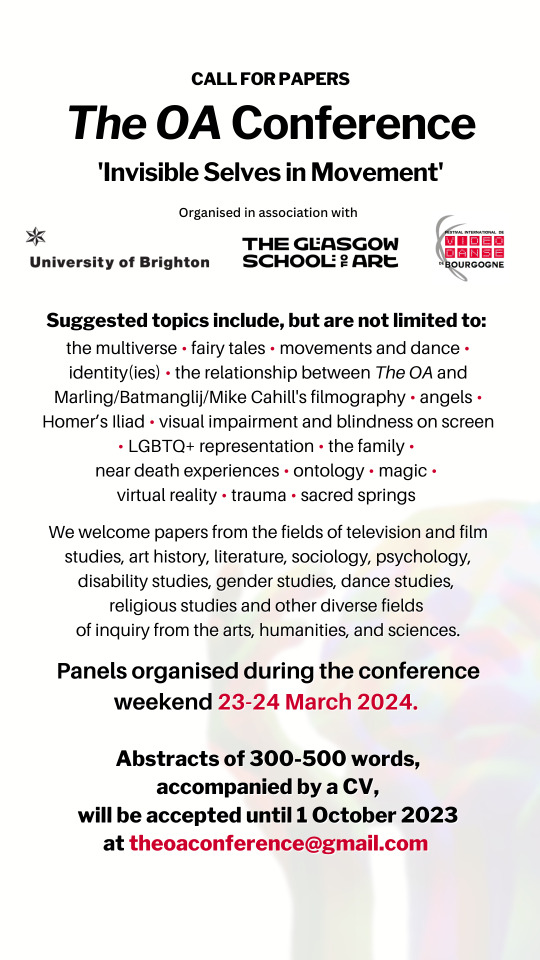
Online conference about The OA, 23-24 March 2024
#the oa netflix#theoa#the OA is real#save the OA#brit marling#Zal batmanglij#a murder at the end of the world#conference#call for papers#the OA#invisible self
59 notes
·
View notes
Text
Conference Call for Papers 2024
This is an ENTIRELY ONLINE conference, so anyone can attend across different time zones. CFP is open until end of March.
Devils and Justified Sinners – 2024 Conference

View On WordPress
#call for papers#cfp#conference#devils and justified sinners#james hogg#romancing the gothic#theology
8 notes
·
View notes
Text
CFP: Centering Blackness in Fan Studies **DEADLINE EXTENDED**
This special issue centers Blackness in fandom studies. Fandom studies has gestured toward race generally, and Blackness in particular, from its alleged white center while always keeping race at its margin. It has largely co-opted the language of race, difference, and diversity from the margins and recentered it around white geeks and white women. Indeed, fandom studies has done lots of things—except deal with its race problem. But as Toni Morrison (1975) asserts, that is the work of racism: it keeps those at the margins busy, trying to prove that they deserve a seat at the center table. In this way, those considered marginal expend energy trying to be granted access to the center while citing, reifying, and expanding the supposed universality of the center that fails to engage the margin because it is too particular. If, as the title of Audre Lorde’s famous 1984 essay reminds us, “The Master’s Tools Will Never Dismantle the Master’s House,” then it is time to willfully ignore white fandoms, just as Black fandoms have been willfully ignored.
For this special issue, we seek to privilege and celebrate Blackness, not as a comparative but as enough on its own. We want essays that build on the relatively small but groundbreaking scholarly work that centers Black fandoms, including work on young Black male (Brown 2000) and female (Whaley 2015) comic readers; Black gay sitcom fans (Martin 2021a); Black fan “defense squads” that protect fictional characters’ Blackness (Warner 2018); Black fan labor (Warner 2015); Black antifandom (Martin 2019b); Black fans’ enclaving practices (Florini 2019b); Black female music fans (Edgar and Toone 2019); and Black acafans (Wanzo 2015). It also engages and with and builds on our Black feminist foremothers, including bell hooks (1992), Jacqueline Bobo (1995), and Robin Means Coleman (1998), who showed us ways to think about how Black audiences engage with media. This corpus of work on Black audiences and fandoms provides a base for further theorization about the experiences and meanings of Black fandom. We encourage work that engages, nuances, and challenges this foundational work, leading to novel reconsiderations of how fan studies defines and understands Black fandoms.
We invite submissions that contribute to a conversation that centers Black audiences, fans, antifans, and global Blackness itself. We are not interested in comparative studies of Black fandom practices, because Blackness is enough. This issue seeks to center Blackness and (anti)fandom in all of its permutations. We hope the following suggested topics will inspire wide-ranging responses.
Black folks and “doing” fandom.
Black fans and deployment of (anti)fandom.
Black fan practices imbricated in a politics of representation.
Affective Black fandoms.
The politics of Black (anti)fandoms.
Interactions between Black fans and media producers.
Audience/fan response to Black-cast remakes and recasting non-Black-cast texts with Black actors.
Black fandoms of non-Black-cast media.
Blackness and enclaving.
Black music fandom.
Black sports fandom.
Black fandom and labor.
Black fandom and affect.
Black antifandom and hate.
Global Black fandoms.
Black fandom and contemporary or historical politics.
Mediated constructions of Blackness.
Black fandoms and celebrities/parasocial relationships.
Black queer fandom.
Disabled Black fandom.
Case studies of specific texts related to Black fandom.
Historical and archival accounts of Black fandom.
Submission Guidelines
Transformative Works and Cultures (TWC, http://journal.transformativeworks.org/) is an international peer-reviewed online Gold Open Access publication of the nonprofit Organization for Transformative Works, copyrighted under a Creative Commons License. TWC aims to provide a publishing outlet that welcomes fan-related topics and promotes dialogue between academic and fan communities. TWC accommodates academic articles of varying scope as well as other forms, such as multimedia, that embrace the technical possibilities of the internet and test the limits of the genre of academic writing.
Submit final papers directly to Transformative Works and Cultures by January 1, 2023. JULY 1, 2023
Articles: Peer review. Maximum 8,000 words.
Symposium: Editorial review. Maximum 4,000 words.
Please visit TWC's website (https://journal.transformativeworks.org/) for complete submission guidelines, or email the TWC Editor ([email protected]).
Contact—Contact guest editors Alfred L. Martin Jr. and Matt Griffin with any questions before or after the due date at [email protected].
Due date—July 1, 2023, for 2024 publication.
Works Cited
Bobo, Jacqueline. 1995. Black Women as Cultural Readers. New York: Columbia University Press.
Brown, Jeffrey A. 2001. Black Superheroes, Milestone Comics, and Their Fans. Jackson: University Press of Mississippi.
Click, Melissa A., and Sarah Smith-Frigerio. 2019. “One Tough Cookie: Exploring Black Women’s Responses to Empire’s Cookie Lyon.” Communication Culture and Critique 12 (2): 287–304. http://dx.doi.org/10.1093/ccc/tcz007.
Coleman, Robin R. Means. 1998. African American Viewers and the Black Situation Comedy: Situating Racial Humor. New York: Routledge.
Early, Gerald. 1988. “The Black Intellectual and the Sport of Prizefighting.” Kenyon Review 10 (3): 102–17.
Edgar, Amanda Nell, and Ashton Toone. 2019. “‘She Invited Other People to That Space’: Audience Habitus, Place, and Social Justice in Beyoncé’s Lemonade.” Feminist Media Studies 19 (1): 87–101. https://doi.org/10.1080/14680777.2017.1377276.
Everett, Anna. 2001. Returning the Gaze: A Genealogy of Black Film Criticism, 1909–1949. Durham, NC: Duke University Press.
Florini, Sarah. 2019a. Beyond Hashtags: Racial Politics and Black Digital Networks. New York: NYU Press.
Florini, Sarah. 2019b. “Enclaving and Cultural Resonance in Black Game of Thrones Fandom.” In “Fans of Color, Fandoms of Color,” edited by Abigail De Kosnik and andré carrington, special issue, Transformative Works and Cultures, no. 29. https://doi.org/10.3983/twc.2019.1498.
hooks, bell. 1992. Black Looks: Race and Representation. Boston: South End Press.
Martin, Alfred L., Jr. 2021a. The Generic Closet: Black Gayness and the Black-Cast Sitcom. Bloomington: Indiana University Press.
Martin, Alfred L., Jr. 2021b. “Blackbusting Hollywood: Racialized Media Reception, Failure, and The Wiz as Black Blockbuster.” JCMS: Journal of Cinema and Media Studies 60 (2): 56–79. http://dx.doi.org/10.1353/cj.2021.0003.
Martin, Alfred L., Jr. 2019a. “Fandom while Black: Misty Copeland, Black Panther, Tyler Perry, and the Contours of US Black Fandoms.” International Journal of Cultural Studies 22 (6): 737–53. http://dx.doi.org/10.1177/1367877919854155.
Martin, Alfred L., Jr. 2019b. “Why All the Hate? Four Black Women’s Anti-fandom and Tyler Perry.” In Anti-fandom: Dislike and Hate in the Digital Age, edited by Melissa A. Click, 166–83. New York: NYU Press.
Morrison, Toni. 1975. “A Humanist View, Part 2.” Presented at Black Studies Center public dialogue, Portland State University, May 30, 1975. Transcription available at: https://www.mackenzian.com/wp-content/uploads/2014/07/Transcript_PortlandState_TMorrison.pdf.
Rose, Tricia. 1994. Black Noise: Rap Music and Black Culture in Contemporary America. Hanover, NH: Wesleyan University Press.
Shankman, Arnold. 1978. “Black Pride and Protest: The Amos 'n' Andy Crusade.” Journal of Popular Culture 12 (2): 236–52. http://dx.doi.org/10.1111/j.0022-3840.1979.1202_236.x.
Stewart, Jacqueline Najuma. 2005. Migrating to the Movies: Cinema and Black Urban Modernity. Berkeley: University of California Press.
Tracy, James F. 2001. “Revisiting a Polysemic Text: The African American Press's Reception to Gone with the Wind.” Mass Communication and Society 4 (4): 419–36. http://dx.doi.org/10.1207/S15327825MCS0404_6.
Wanzo, Rebecca. 2015. “African American Acafandom and Other Strangers: New Genealogies of Fan Studies.” Transformative Works and Cultures, no. 20. https://doi.org/10.3983/twc.2015.0699.
Warner, Kristen. 2018. “(Black Female) Fans Strike Back: The Emergence of the Iris West Defense Squad.” In Routledge Companion to Media Fandom, edited by Melissa A. Click and Suzanne Scott, 253–61. New York: Routledge.
Warner, Kristen J. 2015. “ABC’s Scandal and Black Women’s Fandom.” In Cupcakes, Pinterest, and Ladyporn: Feminized Popular Culture in the Early Twenty-First Century, edited by Elana Levine. Champaign: University of Illinois Press.
Whaley, Deborah Elizabeth. 2015. Black Women in Sequence: Re-inking Comics, Graphic Novels, and Anime. Seattle: University of Washington Press.
#cfp#twc#otw#fan studies#fandom#academia#academic journals#academic chatter#call for papers#blackness#black fans#black fandom#black fanfiction#black fanfic writer#black labor#black antifandom#black music#black sports#black media#black queerness#fanfiction
233 notes
·
View notes
Text
I'm just discovering now that there was a call for paper for a conference on "goblin modes". Another missed opportunity.
#grad student#call for papers#goblincore#gradblr#studyblr#academia#litblr#bookblr#goblin mode#dark academia#chaotic academia
4 notes
·
View notes
Text
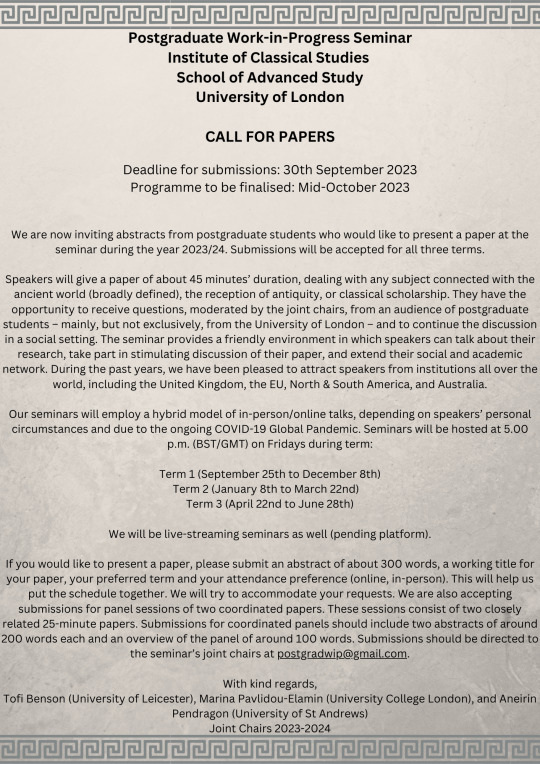
A call for papers for postgraduates for the ICS Work in Progress Seminar. Speakers will give a paper of about 45 minutes’ duration, dealing with any subject connected with the ancient world (broadly defined), the reception of antiquity, or classical scholarship. Abstract should be 300 words, a working title for the paper, your preferred term, and your attendance preference (online, in person). We are also accepting panel sessions of two coordinated papers. These sessions consist of two closely related 25-minute papers. Submissions for coordinated panels should include two abstracts of around 200 words each and an overview of the panel of around 100 words. Submissions should be directed to the seminar’s joint chairs at [email protected].
#tagamemnon#tagitus#Ancient Greek#Ancient Rome#Ancient World#call for papers#graduate school#y’all should reblog this
10 notes
·
View notes
Text
*In the theme of Mystery Bruise*
Oh-oh-oh Dream CFP
Please let me write on idkhow
How do I make THIS CONNECT?!
4 notes
·
View notes
Text
AktivistA 2023: Aufruf für Beiträge/Call for Submissions
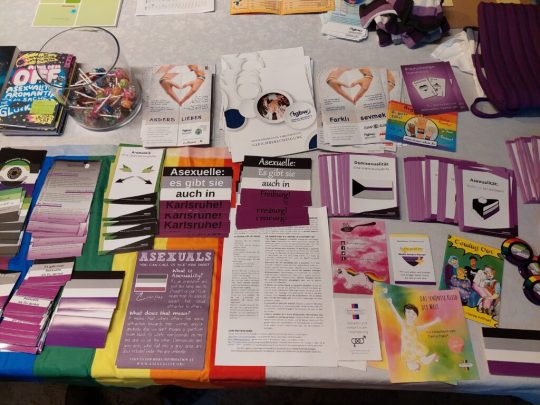
Was suchen wir?
Für ein abwechslungsreiches Programm am Samstag sind wir auf der Suche nach Beiträgen. Wir haben Platz für maximal vier Vorträge oder Ähnliches von je höchstens 45 Minuten. „Ähnliches“ kann zum Beispiel ein Workshop, ein Film, oder sonst etwas sein.
Thematisch freuen wir uns über alles, was mit der queeren Community zu tun hat, natürlich gerne mit Bezug oder im Verhältnis zum asexuellen Spektrum. Auch wenn ihr intersektional denkend unterwegs seid, wäre hier eine Gelegenheit, uns einen Blick über den Tellerrand zu erlauben.
Da letztes Jahr ein kurzer Input zu Lithsexualität gut ankam: Hat vielleicht eine Person mit einem sogenannten Mikrolabel Interesse, uns an ihrer Erfahrungswelt teilhaben zu lassen?
Was erwartet euch?
Wir rechnen mit Besuch von 25 bis 40 Menschen verschiedener Altersgruppen und mit sehr unterschiedlicher Vorbildung.
Wie gehabt tragen wir die Fahrtkosten und spendieren euch ein Mittagessen. Ein kleines Honorar abhängig von der Vortragslänge winkt ebenfalls.
Wenn ihr also eine coole Idee habt, wie ihr uns den Samstag bereichern wollt, schreibt uns bitte über das Kontaktformular oder meldet euch über Facebook oder Insta bei uns.
8 notes
·
View notes
Text
3 notes
·
View notes
Text
Also, I kept forgetting to post this over here, but - scholar and independent scholar friends, if you’re working on something fantasy-related, and you would like to come hang out with me in November at the PAMLA conference in Los Angeles, the paper proposal deadline is May 15! (It’ll likely be extended - submissions overall have been low so far!)
I’m your Fantasy & the Supernatural Area Chair for PAMLA (the Pacific Ancient & Modern Language Association), so, send me your ideas! And we’re in the final year of our “special session” status before we become a standing session - basically, once we prove that we can fill a session for three years running, I don’t have to propose it anew each year, it’ll be automatic! So come help me make this one a success!
Here’s our Call For Papers...(and here’s the link)
#
Fantasy and the supernatural, broadly defined, shape many popular narratives and universes—from Lord of the Rings to Game of Thrones, from World of Warcraft to The Witcher, from classical and medieval tales of monsters and dragons to the worlds of N.K. Jemisin, Terry Pratchett, Neil Gaiman, Nnedi Okorafor, and Ursula K. Le Guin. As a genre, fantasy engages with questions of rhetoric, identity, and power in multiple ways, across media, subgenres, and cultural traditions; the enchantment of fantastic and supernatural narratives casts a persistent and global spell.
In the third year of this special session on the fantastic, proposals dealing with fantasy, the fantastic and the supernatural, and/or intersections of fantasy and other genres, media, or time periods are welcome. Special consideration will be given to proposals which intersect with the 2022 PAMLA conference theme of “Geographies of the Fantastic and Quotidian,” focusing on landscapes of both the imagination and of everyday experience, exploring the topographies and topologies of our constructed narratives. Examples might include examinations of fantasy settings, imagined cities, (re)imaginings of historical/present-day locations, maps and processes of mapping-out/map-making, journeys and travelogues, land-tending, border crossings, dispossession and diaspora, hauntings, interiority/exteriority, and more—though any general submissions dealing with fantasy or the fantastic are encouraged.
#
The system will make you make an account to log in and actually submit your proposal, and then I can go through them! <3
37 notes
·
View notes
Link
#open calls#call for submission#call for entry#call for writers#call for papers#call for artists#poetry#poetess#women poets
5 notes
·
View notes
Text
Call for Papers
1.
Ich habe die Ehre, für Marietta Auer die Projekte zu koordinieren, die mit dem Leibnizpreis verbunden sind. Offizieller Start ist der erste Februar 2023. Bereits jetzt haben eine Gruppe von Kollegen am MPI einen call for papers für eine Tagung veröffentlicht, die das Leibnizprojekt fördern und unterstützen wird.
Erstens freut mich die Bennung einer Tagung als Nachwuchstagung, denn das erinnert so an Wildwuchs, also an immer wieder kommende Stoppeln, Wirbel und Flaum, an im September spriessende Pilze oder an Bäume, die im Mai ausschlagen. Das erinnert an zahlreiche Fruchtfliegen bei der Traubenlese und kleine Robben mit großen Augen auf Bildschirmen, die bei aller Größe dieser Augen noch Platz haben, um Kontonummern mitzuteilen. Nachwuchs erinnert an Geschlüpfte mit dauerhaft aufgerissenem Schnabel. Schließlich erinnert Nachwuchs an einen Witz, den Heiner Müller erzählt haben soll, so kolportiert das Werner Hamacher: Steh' ich morgens vor'm Spiegel. Kenn' ich nich', rasier' ich nich', aber das habe ich ja schon gesagt: Stoppeln, Stöpsel, alles toll, toll wenn man den Zustand des Nachwachsens lange, lange, möglichst halten kann.
2.
Zweitens freut mich die Auswahl des Themas, auch wegen der Beiträge die in den letzten Jahren zu den Jurdismen der Wahrheit, etwa durch die Gruppe forensic architecture oder die Forschungen zu science at the bar die Diskussionen um Wahrheit, ihre Produktion und Reproduktion haben laufen lassen. So please please please, schreibt papers.
3 notes
·
View notes
Text
CFP: New Perspectives on the Metal Gear Solid Series
Hi, everyone! There is a call for chapters available for established or emerging scholars or writers who are interested in contributing an original essay for a volume of collected critical essays in the Metal Gear Solid series.
Here is the official link to the CFP: https://call-for-papers.sas.upenn.edu/cfp/2022/08/07/new-perspectives-on-the-metal-gear-solid-series
New Perspectives on the Metal Gear Solid Series
deadline for submissions: December 1, 2022
Editors: Steven Kielich and Chris Hall
contact email: [email protected]
Call for Chapter Proposals: New Perspectives on the Metal Gear Solid Series (edited collection)
Editors: Steven Kielich (University at Buffalo) and Chris Hall (University of the Ozarks)
In 2015, Hideo Kojima and his company Kojima Productions split from Konami after the release of Metal Gear Solid V: The Phantom Pain. Kojima’s departure from Konami marked an unfortunate, but understandable, end to the Metal Gear Solid series. Now, in this “post-Phantom Pain” era, it has become both possible and essential to make a retrospective study of the critically, commercially, and culturally resonant series that was Metal Gear Solid.
The games of Metal Gear Solid pioneered and popularized the stealth video game genre, effortlessly combining cinematic style with innovative gameplay, changing the very fabric of the video game industry. Additionally, the series has retained broad cultural import. From Metal Gear Solid 2’s postmodern, techno-paranoiac take on the digitization of our world, to the deadly language-borne virus threatening to liquidate entire nations in Metal Gear Solid V, each game in the series continues to possess a cutting-edge pertinence to our daily lives. With the series’ conclusion still recently behind us, and its themes more relevant than ever, we have at present a crucial opportunity to consider and reconsider the cultural, historical, political, philosophical, and aesthetic impact of the canonical Metal Gear Solid games.
Coming amid the 35th and 25th anniversaries of Metal Gear (1987) and Metal Gear Solid (1998), this collection welcomes abstract proposals for original contributions from emerging and established scholars. Successful proposals will approach the games of the Metal Gear Solid franchise through a variety of lenses and frameworks. Essays that respond to and extend existing Metal Gear Solid scholarship and criticism in new directions are welcome, as are those that carve out entirely new territory. This collection will serve as exegesis of and critical companion to the series by not only celebrating and critiquing these games, but critically interrogating them.
While each entry in the series has been the subject of spirited debate and critique both within and outside of academia, the series itself has yet to be considered as a whole through a rigorously curated, book-length edited collection. This volume will be the first collection of critical inquiries into the Metal Gear Solid series. Essays should take an interdisciplinary approach in moving to elucidate or complicate the impact of the series. By offering scholars the opportunity to approach the series from new perspectives, contributions will necessarily come from a diverse range of disciplinary and methodological approaches, including but not limited to:
(Subversion of) player expectations, player/personal agency, autonomy, and interactivity
Studies that consider the role of violence, rape, torture, trauma, and memory throughout the series
Studies that consider the series’ approach to gender and sexuality: (hyper)masculinity, femininity, and queerness/feminist or eco-feminist readings of the series
The human and the posthuman; Deleuze’s nonrepresentational philosophy (becoming-animal; becoming-machine; becoming-other)
Essays that consider technology, embodiment, prostheses, and/or possession
Science and medicine: innovation, mechanization, aging, disability, and healing
Bioethics, technoethics, and the (a/im)morality of genetic modification
Essays that analyze neurotechnology (nanomachines; codecs; A.I.; virtual reality) in the series and its potential links with contemporary issues/premises (e.g. Neuralink)
Psychoanalytic/philosophical approaches to the series’ narratives or characters
Analyses of the series’ villains and their motivations
Analyses of the series’ female characters and their motivations
The cinematic, literary, philosophical, musical or historical influences of the series
The presence and importance of the supernatural and magic, dreams and nightmares
Ecocritical approaches: ecology, ecosystems, nature preservation, or character/nature relationships
Race/racism in/of the series: African racial dynamics; whiteness; racialized life
Pedagogies and teaching through the series / approaches to teaching Metal Gear Solid
Critical theory and cultural studies approaches (colonial, imperial, postcolonial)
War and warfare: political readings, including analysis of biopolitics, international relations, terrorism, militarization and war, and nuclear proliferation
Game worlds: narratologies, geographies, topographies
Sound and haptics: hearing, seeing, sensing, and feeling
Studies that account for the material engagements of the series’ game design, art, and promotion, especially Yoji Shinkawa’s art
The topics featured in this call invite scholars to consider a wide range of possibilities as they critically investigate and analyze the canonical entries to the Metal Gear Solidseries: Metal Gear Solid (1998); Metal Gear Solid 2: Sons of Liberty (2001); Metal Gear Solid 3: Snake Eater (2004); Metal Gear Solid 4: Guns of the Patriots (2008); Metal Gear Solid: Peace Walker (2010); Metal Gear Solid V: Ground Zeroes (2014); and Metal Gear Solid V: The Phantom Pain (2015). Authors are welcome to include non-canonical titles in the series, but these should not be their primary focus. The essays that are received from this call will be reviewed and assembled by the editors so as to provide the most cohesive and well-rounded arrangement of critical work. The volume is aimed at a scholarly audience while still being as accessible as possible to fans and enthusiasts of the Metal Gear Solid games.
Please submit a 300-500 word abstract of your proposed chapter contribution and a brief CV including complete contact information by December 1st, 2022 to Steven Kielich and Chris Hall at [email protected]. Authors are welcome to reach out to Steven Kielich ([email protected]) or Chris Hall ([email protected]) directly with any inquiries, but please do not submit abstracts, CVs, or contact information to the editors’ .edu emails.
Full chapters of accepted proposals will be between 5,000-8,000 words and will likely be due late April 2023 after signing a contract with a publisher. This collection is currently under consideration with McFarland & Co. for their Studies in Gaming series, edited by Matthew Wilhelm Kapell, and has received considerable interest from the press.
Note that acceptance of a proposed abstract does not guarantee the acceptance of the full chapter into the completed volume.
Please share this link and CFP to anyone who you think might be interested in writing about Hideo Kojima’s Metal Gear Solid series!
#cfp#callforpapers#call for papers#call for chapters#dark academia#essays#literary criticism#philosophy#psychoanalysis#metal gear solid#mgs#metal gear series#hideo kojima#death stranding#playstation#sony playstation#xbox one#xbox#video games#gaming#games#ecocriticism#kojima productions#gender studies#david hayter#solid snake#otacon#cultural criticism#pop culture#popular culture
3 notes
·
View notes
Text
Dear Connections,
I pleased to invite you to contribute the book chapters for our upcoming book entitled, “Expert’s Handbook on Forensic Toxicology: Analytical Orientation”. The main criterion for acceptance is a clear connection for a lay reader between: “forensic”, “law”, and “education”.
Book Overview
This book elaborates all major elements of forensic toxicology and analytical toxicology techniques as well as the important pats of pharmaceutics, drug metabolism along with complete entails on poisons and methods of detection.
An additional effort can be found in terms of relevant case studies as case studies are necessary component when it comes to in-depth analysis. Also, relevant MCQs are the purposeful add on(s).
For Suggestions/Ideas/Questions please mail us at: [email protected]
Contact/Submission: [email protected]
Online URL: https://forensicfield.blog/call-for-chapters/
Thank You For Your Time.
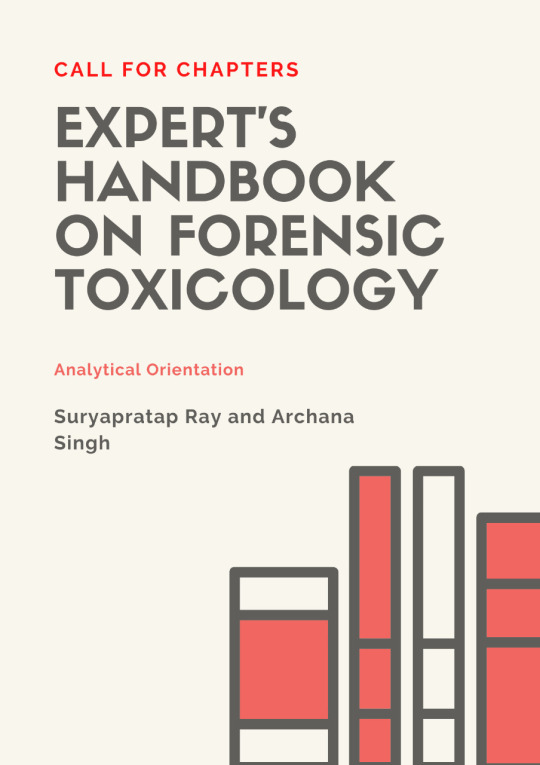
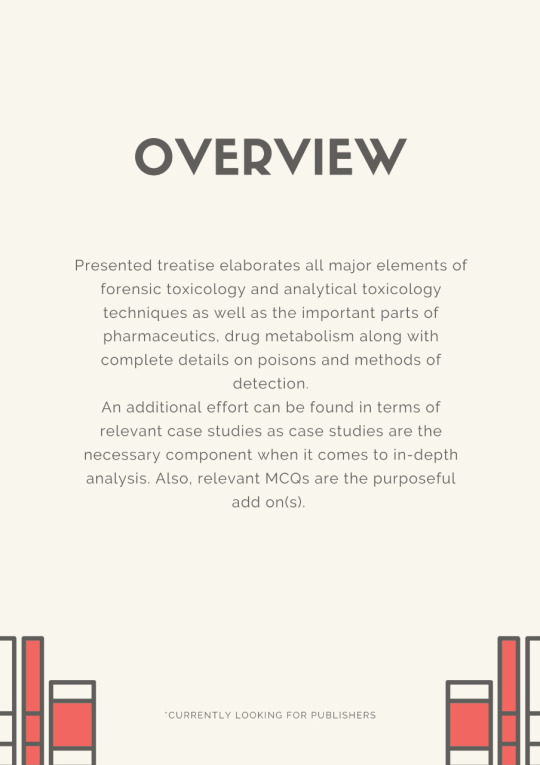
2 notes
·
View notes
Text
CFP: AI and Fandom
Unfortunately, this special issue will not be moving forward. All submitted pieces are being considered for our general issue.
Due in part to well-publicised advancements in generative AI technologies such as GPT-4, there has been a recent explosion of interest in – and hype around – Artificial Intelligence (AI) technologies. Whether this hype cycle continues to grow or fades away, AI is anticipated to have significant repercussions for fandom (Lamerichs 2018), and is already inspiring polarised reactions. Fan artists have been candid about using creative AI tools like Midjourney and DALL-E to generate fan art, while fanfiction writers have been using ChatGPT to generate stories and share them online (there are 470 works citing the use of these tools on AO3 and 20 on FanFiction.net at the time of writing). It is likely the case that even greater numbers of fans are using such tools discreetly, to the consternation of those for whom this is a disruption of the norms and values of fan production and wider artistic creation (Cain 2023; shealwaysreads 2023). AI technology is being used to dub movies with matching visual mouth movements after filming has been completed (Contreras 2022), to analyse audience responses in real-time (Pringle 2017), to holographically revive deceased performers (Andrews 2022; Contreras 2023), to build chatbots where users can interact with a synthesised version of celebrities and fictional characters (Rosenberg 2023), to synthesise celebrities’ voices (Kang et al. 2022; Nyce 2023), and for translation services for transnational fandoms (Kim 2021).
Despite the multiple ways in which AI is being introduced for practical implementations, the term remains a contested one. Lindley et al (2020) consider “how AI simultaneously refers to the grand vision of creating a machine with human-level general intelligence as well as describing a range of real technologies which are in widespread use today” (2) and suggest that this so called ‘definitional dualism’ can obscure the ubiquity of current implementations while stoking concerns about far-future speculations based on media portrayals. AI is touted as being at least as world-changing as the mass adoption of the internet and, regardless of whether it proves to be such a paradigm shift, the strong emotions it generates make it a productive site of intervention into long-held debates about: relationships between technology and art, what it means to create, what it means to be human, and the legislative and ethical frameworks that seek to determine these relationships.
This special issue seeks to address the rapidly accelerating topic of Artificial Intelligence and machine learning (ML) systems (including, but not limited to Generative Adversarial Networks (GANs), Large Language Models (LLMs), Robotic Process Automation (RPA) and speech, image and audio recognition and generation), and their relationship to and implications for fans and fan studies. We are interested in how fans are using AI tools in novel ways as well as how fans feel about the use of these tools. From media production and marketing perspectives we are interested in how AI tools are being used to study fans, and to create new media artefacts that attract fan attention. The use of AI to generate transformative works challenges ideas around creativity, originality and authorship (Clarke 2022; Miller 2019; Ploin et al. 2022), debates that are prevalent in fan studies and beyond. AI-generated transformative works may present challenges to existing legal frameworks, such as copyright, as well as to ethical frameworks and fan gift economy norms. For example, OpenAI scraped large swathes of the internet to train its models – most likely including fan works (Leishman 2022). This is in addition to larger issues with AI, such as the potential discrimination and bias that can arise from the use of ‘normalised’ (exclusionary) training data (Noble 2018). We are also interested in fan engagement with fictional or speculative AI in literature, media and culture.
We welcome contributions from scholars who are familiar with AI technologies as well as from scholars who seek to understand its repercussions for fans, fan works, fan communities and fan studies. We anticipate submissions from those working in disparate disciplines as well as interdisciplinary research that operates across multiple fields.
The following are some suggested topics that submissions might consider:
The use of generative AI by fans to create new forms of transformative work (for example, replicating actors’ voices to ‘read’ podfic)
Fan responses to the development and use of AI including Large Language Models (LLMs) such as ChatGPT (for example, concerns that AO3 may be part of the data scraped for training models)
Explorations of copyright, ownership and authorship in the age of AI-generated material and transformative works
Studies that examine fandoms centring on speculative AI and androids, (e.g. Her, Isaac Asimov, WestWorld, Star Trek)
Methods for fan studies research that use AI and ML
The use of AI in audience research and content development by media producers and studios
Lessons that scholars of AI and its development can learn from fan studies and vice versa
Ethics of AI in a fan context, for example deepfakes and the spread of misinformation
Submission Guidelines
Transformative Works and Cultures (TWC, http://journal.transformativeworks.org/) is an international peer-reviewed online Gold Open Access publication of the nonprofit Organization for Transformative Works, copyrighted under a Creative Commons License. TWC aims to provide a publishing outlet that welcomes fan-related topics and promotes dialogue between academic and fan communities. TWC accommodates academic articles of varying scope as well as other forms, such as multimedia, that embrace the technical possibilities of the internet and test the limits of the genre of academic writing.
Submit final papers directly to Transformative Works and Cultures by January 1, 2024.
Articles: Peer review. Maximum 8,000 words.
Symposium: Editorial review. Maximum 4,000 words.
Please visit TWC's website (https://journal.transformativeworks.org/) for complete submission guidelines, or email the TWC Editor ([email protected]).
Contact—Contact guest editors Suzanne Black and Naomi Jacobs with any questions before or after the due date at [email protected].
Due date—Jan 1, 2024, for March 2025 publication.
Works Cited
Andrews, Phoenix CS. 2022. ‘“Are Di Would of Loved It”: Reanimating Princess Diana through Dolls and AI’. Celebrity Studies 13 (4): 573–94. https://doi.org/10.1080/19392397.2022.2135087.
Cain, Sian. 2023. ‘“This Song Sucks”: Nick Cave Responds to ChatGPT Song Written in Style of Nick Cave’. The Guardian, 17 January 2023, sec. Music. https://www.theguardian.com/music/2023/jan/17/this-song-sucks-nick-cave-responds-to-chatgpt-song-written-in-style-of-nick-cave.
Clarke, Laurie. 2022. ‘When AI Can Make Art – What Does It Mean for Creativity?’ The Observer, 12 November 2022, sec. Technology. https://www.theguardian.com/technology/2022/nov/12/when-ai-can-make-art-what-does-it-mean-for-creativity-dall-e-midjourney.
Contreras, Brian. 2022. ‘A.I. Is Here, and It’s Making Movies. Is Hollywood Ready?’ Los Angeles Times, 19 December 2022, sec. Company Town. https://www.latimes.com/entertainment-arts/business/story/2022-12-19/the-next-frontier-in-moviemaking-ai-edits.
———. 2023. ‘Is AI the Future of Hollywood? How the Hype Squares with Reality’. Los Angeles Times, 18 March 2023, sec. Company Town. https://www.latimes.com/entertainment-arts/business/story/2023-03-18/is-a-i-the-future-of-hollywood-hype-vs-reality-sxsw-tye-sheridan.
Kang, Eun Jeong, Haesoo Kim, Hyunwoo Kim, and Juho Kim. 2022. ‘When AI Meets the K-Pop Culture: A Case Study of Fans’ Perception of AI Private Call’. In . https://ai-cultures.github.io/papers/when_ai_meets_the_k_pop_cultur.pdf.
Kim, Judy Yae Young. 2021. ‘AI Translators and the International K-Pop Fandom on Twitter’. SLC Undergraduate Writing Contest 5. https://journals.lib.sfu.ca/index.php/slc-uwc/article/view/3823.
Lamerichs, Nicolle. 2018. ‘The next Wave in Participatory Culture: Mixing Human and Nonhuman Entities in Creative Practices and Fandom’. Transformative Works and Cultures 28. https://doi.org/10.3983/twc.2018.1501.
Leishman, Rachel. 2022. ‘Fanfiction Writers Scramble To Set Profiles to Private as Evidence Grows That AI Writing Is Using Their Stories’. The Mary Sue, 12 December 2022. https://www.themarysue.com/fanfiction-writers-scramble-to-set-profiles-to-private-as-evidence-grows-that-ai-writing-is-using-their-stories/.
Lindley, Joseph, Haider. Akmal, Franziska Pilling, and Paul Coulton. 2020. ‘Researching AI legibility through design’. In Proceedings of the 2020 CHI Conference on Human Factors in Computing Systems (pp. 1-13). https://doi.org/10.1145/3313831.3376792
Miller, Arthur I. 2019. The Artist in the Machine: The World of AI-Powered Creativity. Cambridge, Massachusetts: MIT Press.
Noble, Safiya Umoja. (2018) Algorithms of Oppression: How Search Engines Reinforce Racism. New York, USA: New York University Press.
Nyce, Caroline Mimbs. 2023. ‘The Real Taylor Swift Would Never’. The Atlantic, 31 March 2023. https://www.theatlantic.com/technology/archive/2023/03/ai-taylor-swift-fan-generated-deepfakes-misinformation/673596/.
Ploin, Anne, Rebecca Eynon, Isis Hjorth, and Michael Osborne. 2022. ‘AI and the Arts: How Machine Learning Is Changing Artistic Work’. Report from the Creative Algorithmic Intelligence Research Project. University of Oxford, UK: Oxford Internet Institute. https://www.oii.ox.ac.uk/news-events/reports/ai-the-arts/.
Pringle, Ramona. 2017. ‘Watching You, Watching It: Disney Turns to AI to Track Filmgoers’ True Feelings about Its Films’. CBC, 4 August 2017. https://www.cbc.ca/news/science/disney-ai-real-time-tracking-fvae-1.4233063.
Rosenberg, Allegra. 2023. ‘Custom AI Chatbots Are Quietly Becoming the next Big Thing in Fandom’. The Verge, 13 March 2023. https://www.theverge.com/23627402/character-ai-fandom-chat-bots-fanfiction-role-playing.
shealwaysreads. 2023. “Fascinating to see…” Tumblr, March 28, 2023, 11:53. https://www.tumblr.com/shealwaysreads/713032516941021184/fascinating-to-see-a-take-on-a-post-about-thehttps://www.tumblr.com/androidsfighting/713056705673592832?source=share
#cfp#twc#otw#fan studies#fandom#academia#academic journals#academic chatter#call for papers#call for submissions#ai#artifical intelligence#machine learning#LLMs#chatgpt#ai fanfic#ai fanart#ai ethics#data ethics
13 notes
·
View notes
Text
cfp / call for proposals: 'roots§routes' accoglie contributi sull'i.a.
[CALL for PROPOSALS
Come può l’IA favorire la nascita di nuove forme di espressione artistica e di interazione con il pubblico? Quali sono i margini dell’azione creativa che vedono l’IA utilizzata, da un lato, come strumento a servizio dell’artistə, e dall’altro come alleata in grado di favorire i processi immaginativi e assumere un ruolo centrale nel processo autoriale di co-creazione? E in che…
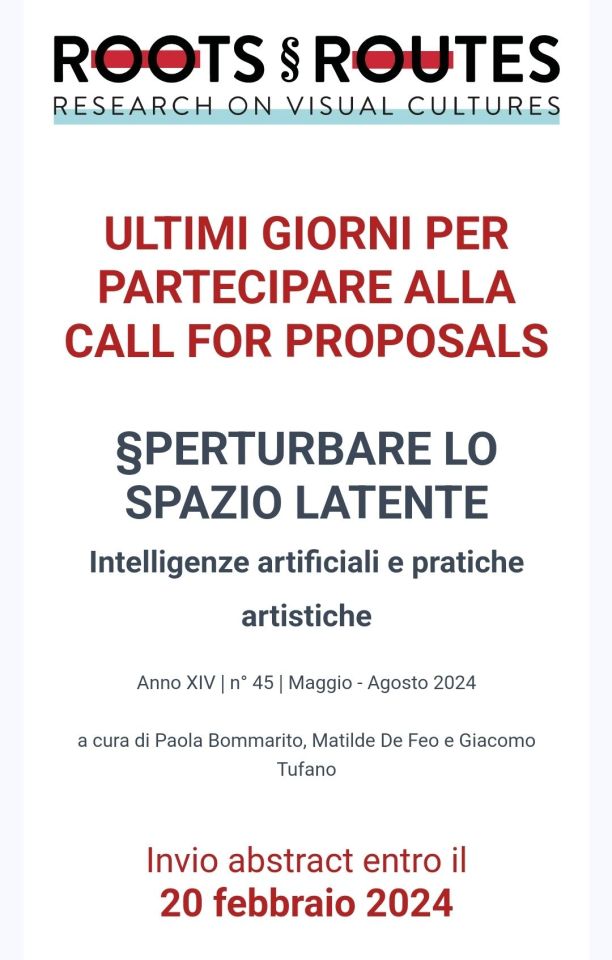
View On WordPress
#AI#artificial intelligence#call for papers#call for proposals#cfp#creatività#IA#intelligenza artificiale#roots & routes#roots§routes
0 notes
Text
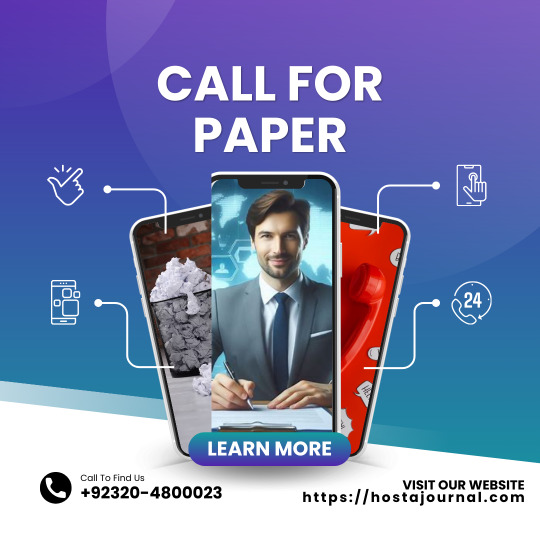
#TogetherWeServe: Join forces with fellow volunteers to address pressing issues and promote social change.
0 notes